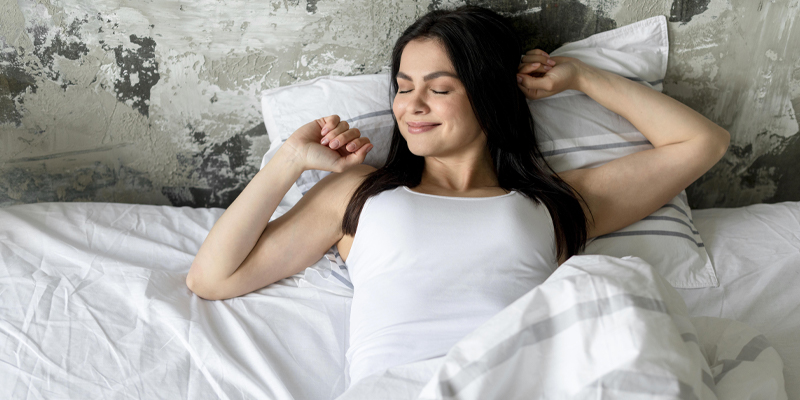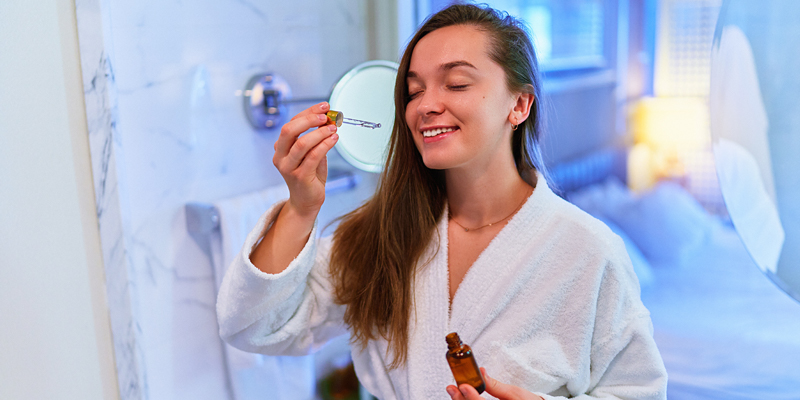Aromatherapy For Insomnia: Best Essential Oils To Try

Insomnia is a common sleep disorder that affects millions of people worldwide. It is characterized by difficulty falling, staying, or both, leading to daytime tiredness, irritability, and poor concentration. While there are several treatment options for insomnia, one alternative method that has gained popularity in recent years is aromatherapy.
Aromatherapy involves using essential oils to improve physical and psychological well-being, and it is believed to be an effective remedy for insomnia.
This article will explore how aromatherapy can help with insomnia and the best essential oils for this purpose.
What is Insomnia?
Insomnia is a sleep disorder that makes it difficult to fall asleep or stay asleep. People with insomnia often feel tired and irritable during the day and have trouble concentrating.
- “For insomniacs, night steals the morning.”
― Terri Guillemets
Various factors, such as stress, anxiety, depression, and certain medications, can cause insomnia.
How Aromatherapy Can Help with Insomnia?
Aromatherapy is a natural treatment for insomnia and a safe way to promote relaxation, reduce stress, and improve sleep quality.
Here are some detailed points on how aromatherapy can help with insomnia:
- Reduces Stress and Anxiety: Aromatherapy is known to have calming effects that can reduce stress and anxiety levels. Essential oils such as lavender, chamomile, and ylang-ylang have soothing properties that help relax the mind and body.
- Promotes Relaxation: Aromatherapy promotes relaxation by activating the parasympathetic nervous system, which is responsible for the body's relaxation response. Essential oils such as bergamot, sandalwood, and patchouli can help induce relaxation and calmness.
- Regulates Sleep-Wake Cycle: The use of essential oils can help regulate the sleep-wake cycle, also known as the circadian rhythm. Essential oils such as cedarwood, vetiver, and frankincense can promote balance and stability, which is essential for a healthy sleep-wake cycle.
- Relieves Pain: Insomnia can be caused by chronic pain, making falling or staying asleep challenging. Aromatherapy can help relieve pain and discomfort, making it easier to fall asleep. Essential oils such as peppermint, eucalyptus, and ginger have analgesic properties that can reduce pain and inflammation.
- Enhances Mood: Aromatherapy can help enhance mood and improve emotional well-being. Essential oils such as lemon, orange, and grapefruit have uplifting properties that can help reduce symptoms of depression and anxiety, which are often associated with insomnia.
- Reduces Snoring: Certain essential oils, such as eucalyptus, peppermint, and thyme, have decongestant properties that can help reduce snoring. Snoring can disrupt sleep and lead to insomnia, making essential oils beneficial for those who suffer from snoring.
- Improves Breathing: Aromatherapy can help improve breathing, essential for a good night's sleep. Essential oils such as tea tree, peppermint, and eucalyptus can help clear the airways, making breathing easier while sleeping.
- Non-Invasive: Aromatherapy is a non-invasive treatment option for insomnia, making it a safer alternative to prescription medications. It does not have any side effects, making it suitable for those who may be sensitive to medication.
Best Essential Oils for Insomnia
Here are some of the best essential oils to try for insomnia:
- Lavender Oil - One way to use lavender oil as a sleep aid is by diffusing it in your bedroom before bed. The calming and relaxing properties of lavender oil can help reduce stress and anxiety, promoting better sleep. You can also add a few drops of lavender oil to a warm bath or apply it topically to the soles of your feet.
- Chamomile Oil - You can diffuse chamomile oil in your bedroom to promote relaxation and calmness. Its soothing properties can help reduce anxiety and promote sleep. Another way to use chamomile oil is to add a few drops to your bathwater before bedtime.
- Bergamot Oil - Diffusing bergamot oil in your bedroom can help reduce stress and anxiety, improving your sleep quality. Its citrusy scent can also promote relaxation and calmness. You can also apply bergamot oil topically or add it to your bathwater.
- Valerian Oil - Valerian oil is a potent sedative that should be used with caution and under the guidance of a healthcare professional. However, diffusing valerian oil in your bedroom can help promote sleep and reduce anxiety. You can also apply it topically to the soles of your feet.
- Ylang Ylang Oil - You can diffuse Ylang Ylang Oil in your bedroom to promote relaxation and calmness. Its sweet floral scent can help reduce stress and anxiety, improving your sleep quality. You can also apply ylang-ylang oil topically or add it to your bathwater.
- Vetiver Oil - Diffusing vetiver oil in your bedroom can help promote relaxation and calmness. Its earthy scent can help reduce anxiety and improve sleep quality. You can also apply vetiver oil topically or add it to your bathwater.
- Frankincense Oil - You can diffuse frankincense oil in your bedroom to promote relaxation and calmness. Its woody and spicy scent can help reduce stress and anxiety, improving your sleep quality. You can also apply frankincense oil topically or add it to your bathwater.
How to Use Essential Oils for Insomnia?
Using essential oils for insomnia can be an effective and natural way to promote relaxation, reduce anxiety, and improve sleep quality. However, it's important to use them safely and appropriately. There are several ways to use essential oils for Insomnia Treatment At Home.
Here are some important tips on how to use essential oils as a sleep aid for insomnia:
Choose the Right Essential Oils:
Not all essential oils are equal when promoting sleep. Look for essential oils with soothing properties, such as lavender, chamomile, and ylang-ylang. These essential oils can help calm the mind and body, making falling and staying asleep easier.
Diffuse Essential Oils:
One of the easiest ways to use essential oil as a sleep aid is to diffuse them. Use a diffuser to disperse the essential oils into the air. This allows you to breathe in oils, promoting relaxation and calmness. Before sleeping, you can diffuse essential oils such as lavender, chamomile, and ylang-ylang in the bedroom.
Topical Application:
You can also apply essential oils topically to help promote sleep. Mix a few drops of essential oil with carrier oil, such as coconut or jojoba oil, and apply to the soles of the feet or the back of the neck. This can help the essential oils absorb into the skin, providing a calming effect.
Pillow Spray:
You can create a pillow spray using essential oils to promote sleep. Mix a few drops of essential oil with water in a spray bottle and spritz on your pillow before sleeping. This can help create a relaxing and soothing atmosphere in the bedroom.
Bath:
A warm bath with essential oils can also help promote sleep. Add a few drops of essential oil, such as lavender or chamomile, to your bathwater and soak for 15-20 minutes. This can help relax the muscles and promote relaxation, making it easier to fall asleep.
Massage:
Massaging the body with essential oil can also be an effective sleep aid. Mix a few drops of essential oil with a carrier oil and massage the feet, neck, and shoulders before bed. This can help relax the muscles and promote a sense of calmness.
Precautions:
While essential oils can promote sleep, it is important to use them cautiously. Some essential oils can cause skin irritation or allergic reactions. Always dilute essential oils with carrier oil and do a patch test before using them topically. Also, avoid using essential oils near the eyes, mouth, and nose.
Overall, essential oils can be a safe and effective sleep aid for insomnia patients. Incorporating essential oils into your bedtime routine can promote relaxation and calmness, helping you achieve restful and rejuvenating sleep.
Precautions When Using Essential Oils
● Always dilute essential oils with carrier oil before applying them to your skin.
● Do a patch test before using an essential oil
● Avoid using essential oils if you are pregnant or breastfeeding unless under the guidance of a healthcare professional.
● Keep essential oils out of reach of children.
● Do not ingest essential oils.
● Do not apply essential oils near your eyes or on broken skin.
Conclusion
Aromatherapy can be an effective and natural treatment for insomnia. Essential oils such as lavender, chamomile, bergamot, valerian, ylang-ylang, vetiver, and frankincense can promote relaxation, reduce stress, and improve sleep quality. However, it's important to use essential oils safely and under the guidance of a healthcare professional if you have any medical conditions or are pregnant or breastfeeding.
FAQs
o Can Essential Oils Cure Insomnia?
Essential oils cannot cure insomnia but can help promote relaxation and improve sleep quality.
o Are Essential Oils Safe To Use?
Essential oils can be safe to use when used properly. However, you can use them with caution and under the guidance of a healthcare professional if you have any medical conditions or are pregnant or breastfeeding.
o How Long Does It Take For Essential Oils To Work?
The effects of essential oils can vary depending on the individual and the method of use. Some people may feel the effects immediately, while others may take longer.
o Can I Mix Different Essential Oils Together?
Yes, you can mix different essential oils together to create a blend that suits your needs. However, it's important to dilute them properly and use them safely.
o Can I Use Essential Oils Instead Of Medication For Insomnia?
It's important to consult with a healthcare professional before using essential oils instead of medication for insomnia. Essential oils can be a complementary treatment but may only be effective for some.
o What Is A Natural Treatment For Insomnia?
A natural treatment for insomnia includes non-pharmacological interventions such as cognitive-behavioral therapy, relaxation techniques, and sleep hygiene practices.
o What Are Some Home Remedies For Insomnia?
Home remedies for insomnia include drinking warm milk, taking a warm bath, practicing relaxation techniques such as meditation or deep breathing, and avoiding caffeine and electronic devices before bedtime.
o Can You Use Essential Oil As A Sleep Aid?
Yes, you can use essential oil as a sleep aid to promote relaxation and improve sleep quality. Some commonly used sleep aid essential oils include lavender, chamomile, and valerian.
o What Is The Best Way To Use Essential Oils For Insomnia Treatment At Home?
The best way to use essential oils for insomnia treatment at home is to diffuse them in a diffuser, apply them topically with a carrier oil, or add them to a warm bath. It's important to follow proper dilution guidelines and use essential oils safely.
o Is It Possible To Treat Insomnia Without Medication?
Yes, it's possible to treat insomnia without medication through non-pharmacological interventions such as cognitive-behavioral therapy, relaxation techniques, sleep hygiene practices, and natural treatment such as essential oils.
